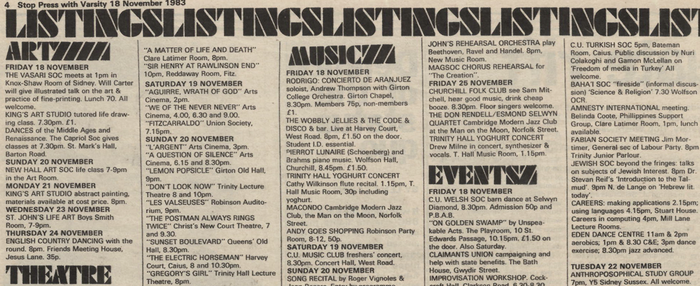Vintage Varsity: How to rig your society election
Resident archivist Alex Myall looks through the many rigging scandals of Cambridge’s past

So, you want to rig your society’s election. Maybe you want to expand your control of the committee. Maybe your dreams of becoming the next Keir Mather or Olly from The Thick of It (“you’re not in a punt now you Oxbridge Twat”) are dependent on your election to the all-powerful CUCA/CULC/CULA/Union committee. This archivist, turned activist for hackery, will provide you with some valuable lessons to win your upcoming election. Alternatively, this may also be a helpful resource for returning officers looking to foil the next ballot stuffer (although they have also been prone to meddling recently).
“Utilise any unattended ballot boxes to your heart’s content”
One handy example can be seen in the rigging of a Peterhouse JCR election in the 1960s, where one faction decided to secure their victory by stuffing the ballot box Mugabe style. They achieved this by removing 60 ballot papers from the box and replacing them with 60 identical papers in favour of just one of the candidates. The key to this ingenious plot? The returning officer left the ballot box unattended in his room for three hours, as he sheepishly admitted to Varsity. So, my first key tip is to utilise any unattended ballot boxes to your heart’s content, with the proviso that if the ballot box is backed up by an online spreadsheet, editing it while other people can see what you are doing may not be the brightest of ideas.
Perhaps the most famous (alleged) election rigger to go through Cambridge’s hallowed halls is Suella Braverman. In 2000, the future Home Secretary attempted the tried and tested method of buying votes for a CUCA election. Unfortunately for Braverman (who denies the accusation and reportedly tried to escape student journalists “hounding” her at the time), one of the people she tried to bribe reported her to Varsity. So, another top tip is to ensure that anyone you are trying to bribe does not happen to be a journo.
Finally, one group of CUCA members found out in the 1980s that their clique had lost all of the seats in the committee elections, due to rigging by their opponents. This not only resulted in negative press but also in CUCA being reported to Tory Central Office and a barrister being appointed to adjudicate the disagreement. Thus, the final top tip is: don’t make your rigging so obvious that the Supreme Court might get involved.
 News / Uni Scout and Guide Club affirms trans inclusion 12 December 2025
News / Uni Scout and Guide Club affirms trans inclusion 12 December 2025 News / Cambridge study finds students learn better with notes than AI13 December 2025
News / Cambridge study finds students learn better with notes than AI13 December 2025 News / Cambridge Vet School gets lifeline year to stay accredited28 November 2025
News / Cambridge Vet School gets lifeline year to stay accredited28 November 2025 Science / Did your ex trip on King’s Parade? The science behind the ‘ick’12 December 2025
Science / Did your ex trip on King’s Parade? The science behind the ‘ick’12 December 2025 News / Pembroke to convert listed office building into accom9 December 2025
News / Pembroke to convert listed office building into accom9 December 2025









